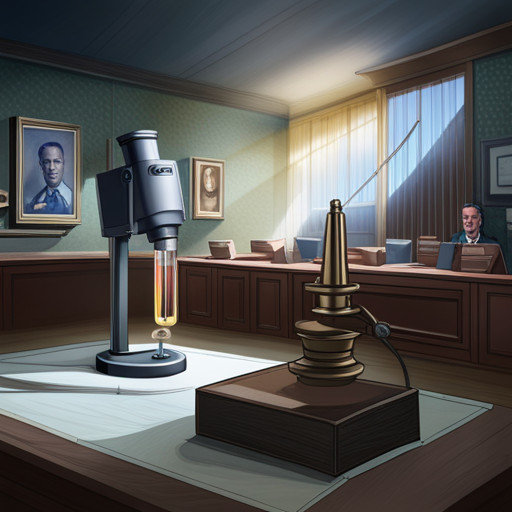Camp Lejeune Water Lawsuits Seek Justice for Kidney Cancer Victims
The magnitude of the Camp Lejeune water contamination scandal is staggering, with carcinogenic chemicals causing kidney cancer among residents.

This article explores the lawsuits seeking justice for affected individuals, scrutinizes the contamination sources, and investigates the role of legal firms in assisting victims.
The discussion further underscores the link between the contaminated water and kidney cancer, while tracking latest developments in the ongoing legal battle.
Key Takeaways
- Camp Lejeune water lawsuits are seeking compensation from the US federal government due to the failure to disclose contaminated drinking water to Marines and their families.
- Exposure to carcinogenic chemicals in the tap water at Camp Lejeune is linked to kidney cancer, which is listed as a presumptive illness caused by drinking the contaminated water.
- Early diagnosis and treatment of kidney cancer are crucial, with a survival rate of over 90% if caught early. Surgery is the primary treatment option, but it carries risks such as bleeding and infection.
- The contamination at Camp Lejeune was caused by various sources, including waste disposal landfills, fuel storage tanks, and a local dry cleaning business. Legal action aims to hold the government accountable for the health consequences of the contaminated water.
Understanding the Contamination Situation at Camp Lejeune

The contamination at Camp Lejeune, notably from unlined waste disposal landfills, underground fuel storage tanks, and a local dry cleaning business, led to the presence of carcinogenic chemicals in the drinking water, a lapse that the Marine Corps and Navy acknowledged but failed to address promptly.
This negligence resulted in the exposure of military personnel and their families to harmful substances. Research indicates the potential health effects of such exposure include various forms of cancer, with kidney cancer being particularly prevalent.
The long-term consequences of this exposure are still being investigated, but there is growing evidence linking the contamination to serious health issues. Despite awareness of the situation, the delay in response intensified the severity of the contamination, highlighting the grave oversight in managing environmental hazards at the camp.
The Link Between Kidney Cancer and the Contaminated Water

Exposure to contaminated drinking sources has been scientifically linked to an increased risk of developing renal malignancies. The correlation between the carcinogenic elements found in the water at Camp Lejeune and the increased incidence of kidney cancer among the exposed population is a matter of ongoing research.
Kidney cancer treatment options often involve invasive procedures such as surgery, with potential long term health effects including postoperative complications and changes in kidney function.
Furthermore, the psychological impact of a cancer diagnosis and its potential implications on life expectancy and quality cannot be neglected. It is therefore crucial to continue investigating the extent of the contamination at Camp Lejeune and its potential role in causing kidney cancer among exposed individuals.
Identifying the Sources of Contamination at Camp Lejeune

Sources of contamination at the marine base included unlined waste disposal landfills, underground fuel storage tanks, and a local dry cleaning business. These factors significantly contributed to the degradation of water quality, impacting military families residing within the base.
The carcinogenic chemicals leaked into the water supply, posing health risks to those exposed. Alarming levels of such contaminants were detected in two water treatment facilities at the base. Measures for preventing future water contamination were not promptly implemented, which could have mitigated the health crisis.
The delay in addressing the issue and the failure to disclose the situation to the residents have led to severe health implications and legal repercussions. The impact of this negligence continues to be a matter of grave concern.
Keeping up With the Latest Developments in the Camp Lejeune Water Lawsuits

Recent developments in the legal pursuits related to the contamination incident have garnered significant attention, shedding light on the plight of those affected, the negligence involved, and the ensuing demand for accountability.
The lawsuits filed by victims of the Camp Lejeune water contamination incident have brought forth the potential compensation for the affected families. The impact on families has been significant, with numerous reported cases of kidney cancer and other serious health conditions allegedly linked to the contaminated water.
Bellwether trials are likely to establish payout levels, and the Camp Lejeune Justice Act enables victims to seek reimbursement for medical expenses, lost wages, and pain and suffering.
These developments symbolize a step towards justice for the victims as they seek accountability from the government for the health consequences of the contamination.
Exploring the Legal Pathway to Justice for the Victims

Legal pathways available for those affected by the contamination incident involve filing claims under the provisions of the Justice Act, which potentially allows for reimbursement of medical expenses, compensation for lost wages, and recognition of pain and suffering. Exploration of these legal pathways reveals a framework designed to address the health consequences of the incident.
This framework includes:
1. Filing for potential compensation under the Justice Act.
2. Seeking legal representation experienced in environmental contamination incidents.
3. Pursuing a legal strategy focused on demonstrating the link between the contamination and adverse health outcomes.
The effectiveness of this framework hinges on the ability to convincingly demonstrate the causal relationship between the contamination and the health consequences experienced, thereby justifying the compensation sought.
Reviewing the Role of Legal Firms in the Pursuit of Justice

Transitioning from the exploration of legal pathways to justice for victims of the Camp Lejeune water contamination, it is crucial to consider the role of legal firms in this pursuit.
The role of attorneys becomes critical in such instances in guiding affected individuals through the complex legal procedures associated with seeking compensation. Legal firms, possessing specialized knowledge in personal injury law, offer indispensable assistance in filing claims under the Camp Lejeune Justice Act.
This includes the presentation of evidence, negotiation of settlements, and representation in court. These firms advocate for victims, ensuring their rights are upheld and their medical expenses, lost wages, and pain and suffering are compensated.
Consequently, attorneys play a paramount role in achieving justice for kidney cancer victims affected by water contamination at Camp Lejeune.
Frequently Asked Questions
What Is the Current Status of the Camp Lejeune Justice Act and Has It Been Successful in Providing Compensation to Victims?
The Camp Lejeune Justice Act is in effect, allowing affected individuals to file claims. Despite criticisms, it has facilitated compensation distribution to victims. Its success, however, is contingent on each case's unique circumstances and legal representation.
How Long Were Marines and Their Families Exposed to the Contaminated Water Before the Issue Was Brought to Light?
The contamination timeline reveals a significant reporting delay. Marines and their families were exposed to carcinogenic water at Camp Lejeune for approximately three decades before the issue was publicly acknowledged in the mid-1980s.
Aside From Kidney Cancer, What Other Health Issues Have Been Linked to the Drinking Water Contamination at Camp Lejeune?
Exposure to contaminated water at Camp Lejeune has been linked to various health issues, including leukemia, non-Hodgkin's lymphoma, Parkinson's disease, and liver disease, signifying the broad impacts of contamination sources and legal precedents.
What Steps Has the US Military Taken to Prevent Such Cases of Water Contamination in the Future?
In response to past water contamination cases, the US military has implemented stringent prevention protocols, enhancing environmental safety practices and accountability measures to ensure potable water quality across all military installations.
Has There Been Any Improvement in the Health Conditions of Those Who Were Exposed to the Contaminated Water After They Moved Away From Camp Lejeune?
Post-contamination, health improvements vary among former Camp Lejeune residents. Although relocation may mitigate further exposure, long-term effects of previous contamination persist. Comprehensive studies are necessary to fully understand the health trajectory of these individuals.

This post has been generated by AI and was not reviewed by editors. This is Not legal advice. Please consult with an attorney.




